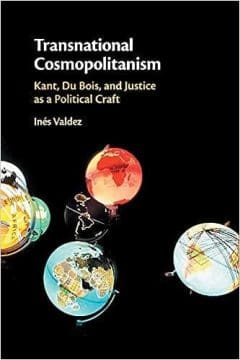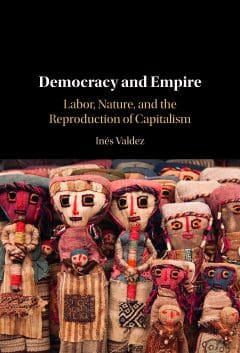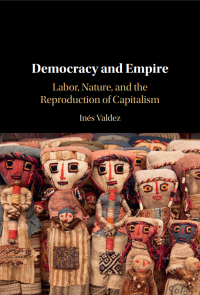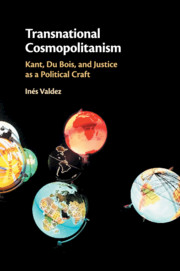
Inés Valdez
Professor
Contact Information
- valdez@jhu.edu
- Curriculum Vitae
- Macaulay 307
- SP25: By Appointment
- Personal Website
Research Interests: Critical race and feminist theory, migration, transnationalism, empire, and racial capitalism.
I am a political theorist. At Johns Hopkins University, I am a professor in the Department of Political Science.
My research is on critical race and feminist theory, migration, transnationalism, empire, and racial capitalism. It has been supported by the Humboldt Stiftung, the Global Arts & Humanities Society of Fellows, the Princeton University Center for Human Values, and the Max Weber Programme.
My book Democracy and Empire: Labor, Nature, and the Reproduction of Capitalism (Cambridge UP) theorizes the material underpinnings of popular sovereignty through an engagement with the Black radical tradition. Popular bonds contain an affective attachment to wealth and a collective agreement to dominate others abroad to secure that wealth, turning self-determination into an excessive entitlement to dominate others. The book integrates racial capitalism with popular rule and self-determination, noting limits of existing accounts and illustrates two material conditions of popular sovereignty: social reproduction obtained through the destruction of kinship of Latino families, and the violent joint conscription and destruction of nature and manual labor in the Global South. In closing, the book conceptualizes an anti-imperial popular sovereignty that embraces ecological responsibility and reciprocity to ground transnational solidarity. You can find the open-access book from Cambridge UP.
"Recipient of the T.V. Paul Best Book Award from the International Studies Association and an Honourable Mention in the Sussex International Theory Book Prize granted by the University of Sussex Centre for Advanced International Theory. Reviewed in Contemporary Political Theory (symposium), Emancipations (symposium), and Review of Politics.
My work on migration explores the construction of punishing lived experiences through enforcement regimes of surveillance, detention and deportation; the role of secularism in obscuring critical practices of contestation of domination; the role of violence in underpinning and constituting law (I also discuss this in the area of policing) and how big data transforms the realm of immigration enforcement and immigration politics as a whole (ongoing).
My 2019 book Transnational Cosmopolitanism: Kant Du Bois, and Justice as a Political Craft makes the case that cosmopolitanism must be transnational. This is because global injustice creates distinct local spaces of oppression that we can only make sense of by exploring their commonalities and origins in common global structures of domination. For this reason, contestation of injustice is ill-served by traditional domestic and international realms of politics, and must instead inaugurate novel (transnational) spaces that straddle these realms (this also applies to the literature on global justice). This can be achieved through transnational consciousness (see more of this) and relations of solidarity that ground transnational public spheres of common temporality and collective will formation that depart from Eurocentric domestic and international fora.
Recipient of the Sussex International Theory Book Prize granted by the University of Sussex Centre for Advanced International Theory.
Books
2023.
Democracy and Empire: Labor, Nature, and the Reproduction of Capitalism (open access). New York: Cambridge University Press (link is to open access book).
2019.
Transnational Cosmopolitanism: Kant, Du Bois, and Justice as a Political Craft (pre-proof version). New York: Cambridge University Press.
Articles
2023.
"Empire, Popular Sovereignty, and the Problem of Self-and-Other-Determination," in Perspectives on Politics 21(1): 109-125 (open access)
2022.
"Toward a Narrow Cosmopolitanism: Kant's Anthropology, Racialized Character and the Construction of Europe," in Kantian Review 27(4): 593-613 (open access)
2021.
"Socialism and Empire: Labor Mobility, Racial Capitalism, and the Political Theory of Migration," in Political Theory 49(6): 902-933
2021.
"Cosmopolitanism without National Consciousness is not Radical: Creolizing Gordon’s Fanon through Du Bois," in Philosophy and Public Affairs 1(2): 283-296- Symposium on Jane Creolizing Political Theory
2020.
"Law, Police Violence, and Race: Grounding and Embodying the State of Exception," in Theory & Event 22(4): tbc [with Mat Coleman and Amna Akbar]
2020.
"Re-reading Idris's Kant and Quṭb through an Excursus into the Cosmopolitan Implications of Barbary Coast Corsairs," in Politics, Religion & Ideology 21(1): 120-123
2020.
"Reconceiving Immigration Politics: Walter Benjamin, Violence, and Labor," in American Political Science Review 114(1):95-108
2019.
"Hemispheric Entanglements and Contemporary Immigration Politics,” in Contemporary Political Theory 18(4): 624-631 - Symposium on Juliet Hooker’s Theorizing Race in the Americas
2017.
"It's not about Race: Good Wars, Bad Wars, and the Origins of Kant's Anti-Colonialism." In American Political Science Review 111(4): 819-834
2017.
"Missing in Action: Practice, Paralegality, and the Nature of Immigration Enforcement." In Citizenship Studies 21(5): 547-569 [with Mat Coleman and Amna Akbar]
2016.
"Punishment, Race, and the Organization of Immigration Exclusion." In Political Research Quarterly 69(4):640-654
Winner:
- WPSA Best Article Published in Political Research Quarterly Award (2016)
- WPSA Pi Sigma Alpha (Best Paper Presented at Conference) Award (2011)
2016.
"Nondomination or Practices of Freedom? French Muslim Women, Foucault, and the Full Veil Ban." In American Political Science Review 110(1):18-30
Winner:
- APSA French Politics Section Stanley Hoffman Award (for Best Article on French Politics Published in the previous two years) (2016)
2013.
"Reel Latinas? Race, Gender, and Asymmetric Recognition in Contemporary Film." In Politics, Groups, and Identities, 1(2): 181-198
2012.
"Perpetual What? Injury, Sovereignty, and a Cosmopolitan View of Immigration." In Political Studies, 60(1): 95-114
2011.
"Residues of Border Control." In Southern Spaces, April [with Susan Harbage Page, reprinted in 2016 in Global Mobilities. Refugees, Exiles, and Migrants in Museums and Archives, ed. Amy Levin (New York: Routledge)]
Chapters
2025.
Forthcoming: "Reconsidering the New International Economic Order: The Marxist Dependency Critique and the Politics of Anticolonialism," in Ciara Cordelli (ed.) Structural Injustice: NOMOS LXVIII. NY: New York University Press: tbd.
2022.
"Anti-Imperial Popular Sovereignty: Martin Luther King, Frantz Fanon and the Possibility of Transnational Solidarity," (in english) in P. Erbentraut and O. Eberl (eds.) Volkssouveränität und Staatlichkeit: Intermediäre Organisationen und Räume der Selbstgesetzgebung (Baden Baden: Nomos Verlag): 169-190
2022.
W.E.B. Du Bois and the Fluid Subject: Dark Princess and the Splendid Transnational in the Harlem Renaissance," in Farebrother and Thaggert (eds.) Expecting More: African American Literature in Transition, 1920-30 (Cambridge University Press): 177-196 (go to pre-proof document / go to CambridgeCore version)
2019.
"Association, Reciprocity, and Emancipation. A Transnational Reading of the Politics of Global Justice," in Duncan Bell (ed.) Empire, Race, and Global Justice (Cambridge: Cambridge University Press): 120-144. (go to pre-proof document / go to Cambridge Core version)
2011.
"From Workers to Enemies: National Security, State Building, and America's War against 'Illegal' Immigrants." In Narrating Peoplehood amidst Diversity. Historical and Theoretical Perspectives, ed. Michael Böss (Aarhus: Aarhus Academic Press), pp. 145-182 [with Desmond King]
Reviews and Replies to Critics
2024
"Symposium on Inés Valdez's Transnational Cosmopolitanism: Kant, Du Bois, and Justice as a Political Craft," in Philosophy & Global Affairs 4(1): 195-202 (with Paul Apostolidis, Inder Marwah, and Lucia Rafanelli)
2022.
"Introduction" and "Reply: Transnational Pasts and Presents. Method and Critique in the Political Theory of Cosmopolitanism" in Symposium on Transnational Cosmopolitanism, Review of Politics 84(1): tbc [with Thomas Donahue-Ochoa, Emma Mackinnon, and Charles Mills] (go to my introduction, and/or to my reply to critics)
2021.
"Globalizing Cosmopolitanism from Below: Difference, Contestation, and Political Economy," in Journal of World Philosophies 6(1): 123-126 [a response to Kok-Chor Tan's "Globalizing Cosmopolitanism"]
Web Publications
2024
"Undoing Empire's Hold on Democracy: An Anti-Imperialist Path Out of the Crisis," a Blog Post at Post-Neoliberalism: Pathways for Transformative Economics and Politics, July 26, 2024.
2019.
"The imperial origins of 'They are taking our jobs'" or (not my favorite title): "Why anti-immigration politics hurt white workers," in Made by History (The Washington Post), August 29
2019.
"Beyond the Dream and Promise Act: Why Democrats must turn the immigrant labor narrative upside down." In LSE US Centre Blog
2017.
"Donald Trump says he’s just enforcing immigration law. But it’s not that simple," in The Monkey Cage (The Washington Post) [with Mat Coleman and Amna Akbar]
2017.
"Donald Trump is expanding a system of immigration enforcement which already punishes immigrants and makes them vulnerable." In LSE US Centre Blog, March 2017
2016.
"From Global to Transnational: Reading Global Justice through W. E. B. Du Bois." In The Disorder of Things Blog, June 2016
Research and policy papers
2015.
"DACA, DAPA, and Beyond: Plus ça change?" Newsletter of the APSA Migration & Citizenship Newsletter 3(2): 35-38

Transnational Cosmopolitanism: Kant, Du Bois, and Justice as a Political Craft
author
Cambridge University Press ,
2019

Democracy and Empire: Labor, Nature, and the Reproduction of Capitalism
author
Cambridge University Press ,
2023
The Political Theory Workshop brings together four core theory events at Macaulay Hall featuring Hopkins’ graduate students and faculty with other theory events co-sponsored with the Political Science Department, the Seminar on Political and Moral Thought, the Constitution Day Event, the Agora Institute, and the departments of Anthropology, Comparative Thought and Literature, Philosophy, and Sociology.

